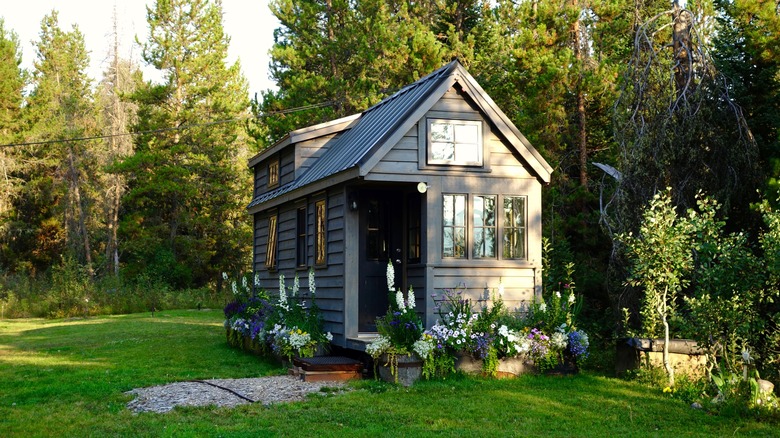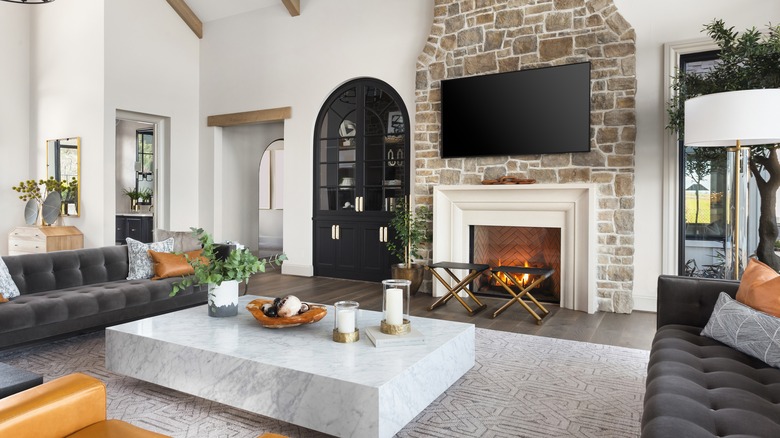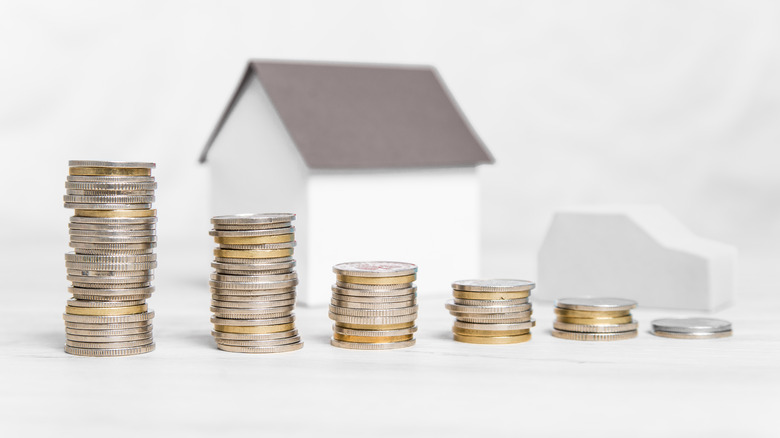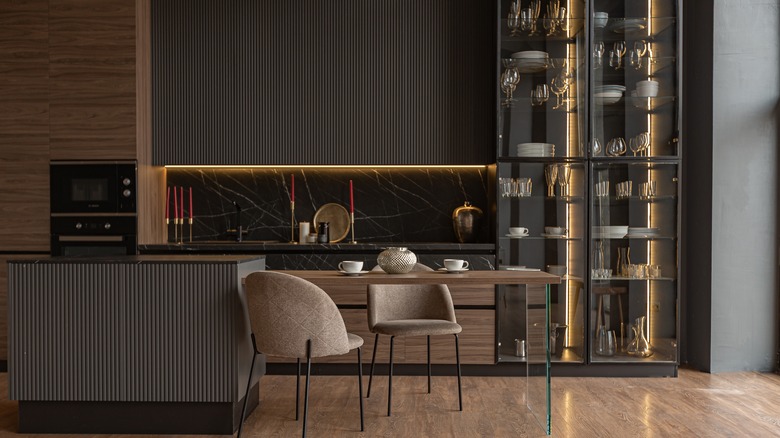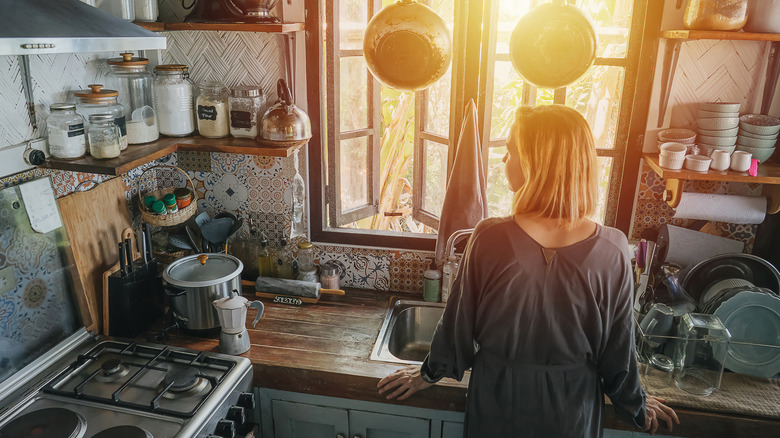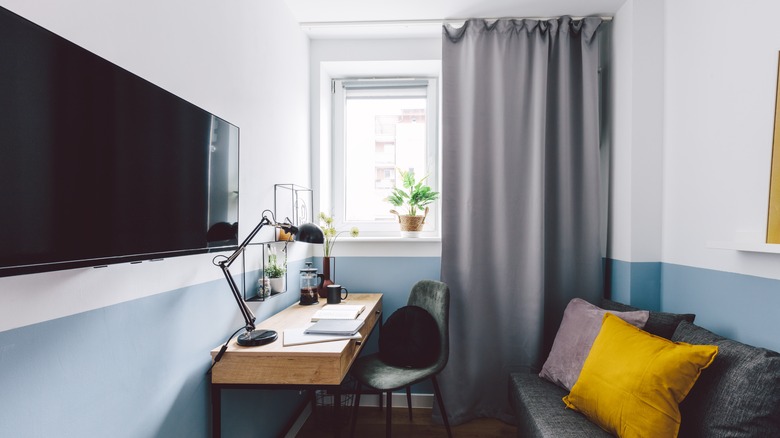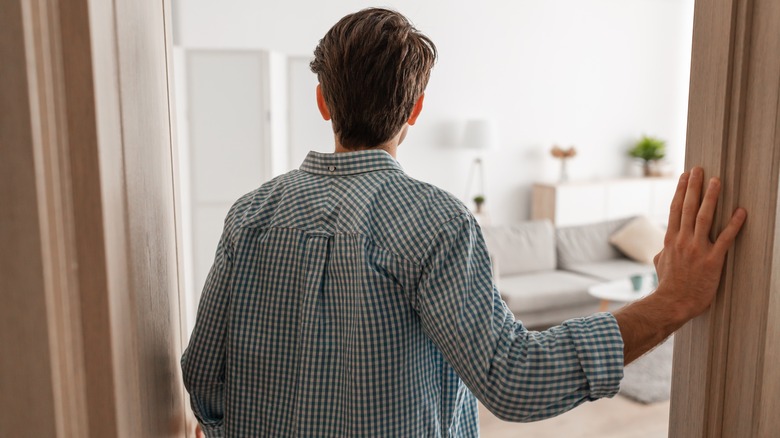Should You Downsize Your Home? Here Are The Pros And Cons Of The Decision
Except for a blip following the 2008 financial crisis, American homes have steadily increased in size for decades. They're huge, and we don't use a lot of that space, so it seems perfectly natural for some U.S. homeowners to hit a point where they say, "enough is enough" and take a stab at downsizing. But while downsizing has its advantages, there are also some reasons to consider staying put or finding a third way.
Among the 38 countries in the Organisation for Economic Co-operation and Development, the United States has the second largest number of rooms per person (2.4, via OECD). American households have fewer people but far more space ... over 1,000 square feet per person on average, about twice as much as in 1973 (via the U.S. Census Bureau). And here's the kicker: We don't use much of it. It won't surprise anyone that formal dining rooms sit empty almost all the time, but the same appears to be true of living rooms and porches.
From time to time, trend-watchers declare that we're starting to downsize our home expectations, though the statistics show only a small percentage of Americans are acting on that impulse. In fact, National Association of Home Builders (NAHB) economist Robert Dietz says home sizes are expected to continue to grow in the post-pandemic era because we have increased the use of our homes for both leisure and work purposes. Something has to give ... or does it?
Why are our homes so large to begin with?
Many factors contributed to the vastness of American homes, from federal regulation and suburbanization to construction methods and favorable local land-use laws. And most of those reasons have nothing to do with how people actually want to live.
The fact that so many Americans live in detached single-family homes won't shock many people. But how did these homes get so big? After all, they didn't start out that way. Postwar suburban homes were around 850 square feet; the average for new construction today is around 2,532 and growing (via the U.S. Census Bureau). The intuitive perspective that the U.S. has a lot of space, so we fill it up, doesn't appear to be the cause of this growth. After all, lot sizes are actually declining (via the Census). Instead, argues The Atlantic, it's a combination of regulatory incentives, cheaper construction, suburbanization itself, driving habits, and a tendency to view real estate — including our homes — as investments.
But there's evidence that this trend is out of step with where we want to find ourselves, especially in later life. More than 60% of Americans in 2,000-square-foot homes or larger say they would choose a smaller house than they currently occupy if they decided to change today. And the numbers are higher for older Americans than younger ones (via Trulia).
How do you arrive at such a momentous decision? If the answer were easy, we wouldn't ask the question. There are pros and cons involved, amounting to a complex and highly personal decision we can only make for ourselves. Here are some things to consider.
Pro: You can save money on your mortgage
According to real estate research firm Trulia, almost half of American homeowners regret their real estate decisions. Sometimes those regrets are centered around details like school district choice, but often it's about making a poor financial decision and paying for it for years. We have regrets because our decisions conflict with our goals: save money, have less debt, build an emergency fund, and reduce credit card debt. You can focus on those goals easier if you have a smaller house with a smaller mortgage payment.
Your mortgage shouldn't be more than 28% of your pre-tax income monthly; downsizing might allow you to make that target number even smaller. Your down payment budget comes from savings and investments, so to protect those, you can choose a less expensive property (a smaller down payment might not make long-term financial sense). And buy in a market that realistically fits your goals. Downsizing from a $250,000 suburban home to a $250,000 tiny house in a trendy urban neighborhood is no way to save money. Maybe it's time to consider transitional areas, more rural locations, or even out-of-state options.
Of course, downsizing can be just another opportunity to make a real estate mistake you will regret. Almost 2/3 of Americans believe housing has been less affordable since 2012, and a surprising number of relatively affluent Americans say they couldn't afford to buy today. So, obviously, make these decisions with great care.
Pro: Saving money on home maintenance
It's easy to lose sight of the underlying costs when caught up in the dream of home ownership or simply owning a new and better home. Not all homeownership expenses scale down as your purchase price or floor space shrink, and some might even increase. GoBankingRates claims there are $1,204 of average monthly home maintenance expenses ... terrifying, given that the median monthly mortgage payment in the U.S. is $1,100 (via Rocket Mortgage).
But let's have a closer look. We can get rid of things that aren't actually maintenance ($201 for utility bills, $218 for property insurance, $250 for HOA fees), though you certainly should plan for them in your accounting. PMI (if you have it) and home insurance will be part of the picture no matter which house you own, so $298/month for general repairs and maintenance is what's left.
That number can shrink if you have a smaller property, but that depends on many factors. You might have a smaller yard or no driveway, so you'll save costs on yard work and snow removal. You can also scale back on outsourcing housekeeping, and might have fewer roof, basement, and garage maintenance issues since they won't be as large. You might also not have things like decks, pools, or patios, which require regular upkeep. Of course, it depends on the property you buy, but you will likely see fewer maintenance bills once you downsize.
Pro: Saying no (or at least less) to materialism
Breaking free of materialism requires you to dedicate a great deal of time and effort to making sound financial decisions. For some, one such good decision might be to downsize to a smaller home. There are a lot of domino effects from that decision that make luxury goods and displays of affluence less urgent.
From a particular perspective, materialism is about accumulating material things that create an image for yourself or help you indulge in excessive luxury. Becoming Minimalist itemizes the things you're trading away to do so, including time, mental energy, freedom from risk and worry, and the environment. Having less space will free you from the possibility of buying things you don't need and only superficially want, and will reduce the "need" to decorate as much.
Regardless of whether you downsize, one way out of this trap is to make a habit of decorating with things you care about rather than things that advance a particular style or image. Anyone worth knowing will not be inclined to criticize you for decorating with your children's artworks, prints you framed yourself from Edward Tufte's "The Visual Display of Quantitative Information," or paintings your mother made in her retirement community.
Pro: Working less and living more
The ideal of the hard-working American holds a lot of charm for most people and a lot of usefulness for the economy overall. But more people are beginning to question this paragon as they seek balance in their work and home lives. A 2014 study published in the Journal of Occupational and Environmental Medicine described the adverse effects of work and home life conflicting, the costs of burnout, and its resulting depression and emotional exhaustion. Naturally, when faced with such a conflict, many people will ultimately prioritize home and family life, which often has financial implications.
One relief valve in this situation is to address the factors that make certain levels of work necessary, such as large mortgage payments. The important thing is to understand all of your financial commitments and the implications of working less. Using Rocket Mortgage's figure of a $1,100 median mortgage payment, that works out to about 28% of the pre-tax income for someone making $25 per hour. In very rough terms, cutting your working hours by 25% could be accomplished by cutting all of your expenses, including your mortgage, by a similar amount, and that would mean a mortgage payment of $825.
It's a worthwhile consideration, because dedicating yourself to an unfulfilling job at the expense of your home life is no way to spend a life at all, and once it's spent, you're not getting a refund.
Con: The potential damage to family closeness
One big aspect of living intentionally is making the time to enjoy loved ones ... an ideal that sometimes falls by the wayside in the rat-race chaos of a prosperous American life. Sometimes downsizing decisions promote family closeness, as when grandparents move closer to their grandkids. But downsizing can occasionally create family problems. Evan Roberts writes poignantly for Storeys about the emotional turmoil he experienced when his parents decided to move away from his childhood home. There was an emotional cost to permanently saying goodbye to the place that housed old memories.
And memories aren't the only issue. Real estate transactions can put inheritances at risk or uproot children from their schools, and sometimes downsized spaces aren't as roomy for family gatherings and the like. For example, if you still love to host holidays, people might feel less inclined to come over when there's little room to sit, let alone sleep over. That tradition might be passed down to a different family member who has a house more conducive for entertaining.
Con: Less house doesn't mean less clutter
It's a common assumption: If you're having trouble keeping your possessions in order, you should have fewer possessions, starting with the container you keep them all in, your home. But is this any more sensible than buying a smaller refrigerator to address a habit of over-eating? Clutter is a habit of mind, and someone who's acquisitive or has the propensity to over-decorate will have a more difficult time in a smaller space. It requires that you not only stop acquiring, but also that you get rid of things you've acquired before.
This conflict is partly caused by the conflation of decluttering and minimalism. They can be related, as described in Becoming Minimalist, but not everyone wants or needs to become a minimalist. Clutter isn't a philosophical proposition; it's a state of having more stuff around you than you're comfortable with. If you don't deal with why you hang onto it in the first place, you'll end up with the usual jumble but in a smaller home.
Con: Empty nests don't always stay empty
We all know a couple who has shipped their last kid off to college and immediately reinvented their lives, starting with a smaller home. There's no sense in air conditioning all that unused space, after all, and college textbooks aren't going to buy themselves. But how does this strategy actually work out, and why are fewer Americans doing it?
The Urban Institute's Housing Finance Policy Center says Millennials are less likely to buy homes than Boomers or GenXers at the same age, for economic and other reasons. One thing they are likely to do is to move in with their parents. This trend has been developing for a while, and the pandemic accelerated and solidified it to the point that more young adults lived with their parents than on their own (via the Pew Research Center). This figure is now about 50%. More than 1/3 of parents think this is a bad thing, while about 16% approve of the trend. Almost half, 47%, take either the more nuanced or more indifferent view that it doesn't really matter. What does matter is that moving into a smaller home could either make this safety net disappear or make it deeply uncomfortable for both the parents and the kids. It's worth considering if you find yourself in that position.
Con: The lure of city life is a bait-and–switch
Runaways from dreary suburbs who find themselves craving the vibrant life of American cities often have little choice in real estate options: If you're going to live in the city, you're going to have to make do with a much smaller home, and there's a good chance you'll have to do some renovations. Those things aren't for everyone.
Lots of evidence suggests that the trend toward an exit from cities to the suburbs or beyond has started reversing itself, from Millennials to retirement-age parents looking for a more active and engaged life. And they are more likely to be active, as evidenced by the fact that urban residents are far less likely to be obese than those living in rural areas, according to the Rural Health Information Hub. And there are many other benefits, from cultural options to lower environmental impact.
But there are costs. Urban dwellers are more likely to experience greater stress levels than their rural and suburban counterparts (via Nature). And how much downsizing is enough? Cities under renewed migration pressure have begun seeing "micro-units" as little as 1/3 the size of average 750-square-foot apartments, to use New York as an example (via The Atlantic). The costs of the bohemian urban lifestyle might be more than some have bargained for.
Downsizing versus right-sizing
Ultimately, whether downsizing is a good idea for any of us is the wrong question. The issue isn't necessarily moving down in size, but in moving toward the right fit for our values and preferences: right-sizing. It's possible that a house of the same size, situated elsewhere, is what you need. Or even, conceivably, a larger home.
This demands careful examination of what you expect and want from life. Simplifying by downsizing might not be for you if you have to give up a life-long woodworking hobby, for example. Or it might mean downsizing the house while upsizing an outbuilding to use as a workshop. Or perhaps what you really would like to get out of a change is a more active life outside, in which case it could make sense to reverse the trend toward larger houses and smaller lots (via the U.S. Census Bureau). And sometimes, using less space requires having more space elsewhere. Look at it this way: If you're downsizing to have more time to go kayaking (or whatever) with your family, it doesn't make sense to get rid of your kayaks just because you haven't used them in a while. Instead, you're going to need a place to store kayaks.
The simplify movement that's been on a low simmer in the United States for years often shows up as a reason for downsizing one's house. The simple life, after all, can't take place in a McMansion. Or can it? It depends on what you mean by "simple" and what ultimately makes you happy. After all, homes don't just have costs. You pay a price for utility, and you must not neglect that side of the equation.
